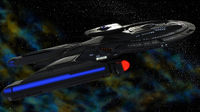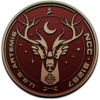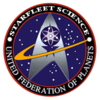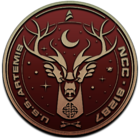USS Artemis-A/Science
| USS Artemis-A | ||
|---|---|---|
 ACTIVE STATUS | ||
| ||

|
Science Department | 
|
| USS Artemis NCC-81287 |
The USS Artemis Science Department consists of officers and enlisted crew whose duty is to conduct scientific research and provide research-based information to the staff. Being a Luna class Explorer/Reconnaissance Science Vessel, the Artemis is equipped with advanced scientific instruments, including the sensor pod characteristic to the class. The extensive science facilities allow the crew to study various different subjects.
Science Centre
The Science Centre is the focal point of all scientific research on the Artemis. Taking almost the entirety of Deck 9, the Centre hosts majority of the science offices and laboratories, including the largest and the most important ones.
Chief Science Officer's office
In the Chief Science Officer's office, the CSO can direct the work of the Department, have meetings with the ship's scientists and other people, and conduct their own studies in privacy. The office is equipped with computer terminals for the CSO’s personal use as well as to observe the status of the science facilities and projects.
Science Offices
Near the CSO's office is the Science office space, which has desks and computer terminals for department's other personnels' use. The scientists can come here to write their reports and papers and easily reach out to their colleagues and supervisors. The ACSO and administrative assistant have their dedicated desks, other workstations can be reserved for long-term use or occupied by first taker for short-term use. The Science crew may also work from their own quarters, in the library, labs or other locations on the ship.
Science Laboratories 1-4
Science Laboratories 1-4 are general laboratories that can easily be modified to serve different purposes, from archaeology to xenology. Labs 1-3 are small-sized, while Lab 4 is mid-sized. They are each highly-modular and can be reserved for short or mid-term projects that don't require unusual configuration or much equipment beyond the standard.
Astrometrics
The Astrometrics lab is dedicated to the study of stars and other objects, such as stellar systems, nebulae and planets, although it can seamlessly work similar to the Stellar Cartography as well. The lab has several workstations and large, curved wall display, but it is also equipped with holoemitters and localised gravity controls for less confined observations.
Stellar Cartography
The Stellar Cartography lab is large, cylinder shaped room that spans a few decks in height. The workstations located in the middle, all walls of the lab operate as a large display. In this lab, the scientists study the sensor recordings and compare them to the existing maps. These efforts allows them to discover new stars, objects and anomalies, as well as to update the maps for navigation, reporting them frequently to the Starfleet Command.
Astrophysics Lab
The Astrophysics Lab is dedicated for the study of physics and chemistry of celestial objects, spatial and subspatial phenomena, and anomalies the ship may encounter or observe. The lab contains several specialized equipment for "hands-on" research experiments, as well as several workstations and a smaller variant of Astrometrics display for observational and theoretical study.
Geology Lab
The Geology Lab serves the physical and chemical study of composition of planets and other rocky objects and is frequented not only by geologists but also by planetary scientists, hydrologists, chemists and others. The lab has several chemistry stations with appropriate safety equipment and access to sample storages, and workstations and holoemitters for observations and other work.
Hydroponics Bay
The Hydroponics Bay is, along with the Arboretum, the hotspot for botanical research. The bay contains several containers divided by transparent aluminium, each with highly modifiable microclimate and rows of vertical gardens, for the purpose of growing plants for research. The produce of the bay may also be used for food, decorative and other purposes.[1]
Other Science Facilities
Some other science facilities are located outside throughout the ship. Despite their location away from the Science Centre, these facilities are used similarly and in similar frequency as those in the Science Centre. The off-site location allows different configurations, sizes and the usage of other nearby amenities.
Hazardous Materials Lab
Hazardous Materials Lab is located on Deck 11. Reserved for the study of materials that may endanger the researchers, the crew or the ship if handled under normal circumstances, the lab has several protective equipment in place. Its deckplating and bulkheads are enforced and it has an independent, isolated life-support system, isolation shields supported by batteries in case of a power outage, and small cargo transporters. The lab is located near the main shuttlebay in case the hazardous material cannot be transported or is discovered on a shuttle. The lab crew have a selection of hazmat suits and other PPE, and the lab can be divided in sections by shields and blast walls to protect the crew. Additionally, the lab has holoprojectors, allowing it to be operated by a holographic crew in case the material is too hazardous for typical researchers.
Science Laboratories 5-7
Science Laboratories 5-7 are located on Deck 11. Labs 5 and 6 are small-sized laboratories, while Lab 7 is a mid-sized one. Similar to the Labs 1-4, they are general laboratories that can easily be modified to serve different purposes. They are typically reserved for long-term projects.
Science Laboratories 8-11
Science Laboratories 8-11 are located on Deck 12. Labs 8 and 9 are mid-sized, and Labs 10 and 11 are large. They are general laboratories that can easily be modified to serve different purposes. Labs 8 and 9 are reserved solely for long term projects, while the use of Labs 10 and 11 is determined by the need for room.
Related Facilities & Resources
While the Science Centre and other science facilities form a bulk of the Science Department work areas, the crew may also be assigned to other locations. Many of these locations are either administered jointly by the Science Department or are solely controlled by some other department or the ship command staff directly but where science crewmembers are often required.
Bridge
The Bridge has a Science station that is manned by a science officer. The Bridge Science Officer's duty is to keep the bridge staff informed of the research projects currently in progress, work as a liaison between the bridge and the Department, advice the bridge staff and coordinate the use of resources such as the sensor arrays. The Bridge Science Officer duty rotates.
Sensor Arrays
The Sensor Arrays are the responsibility of the Operations, and as such sensor time is requested from the Chief Operations Officer or the Bridge Ops Officer. The sensors are often used by the Science Department, but they are also a vital resource for the Ops, Tactical and navigation. Passive sensor readings are available to Stellar Cartography and other Science facilities uninterrupted, but sensor sweeps and probe launches need to be requested in advance. When needed, the sensors can be operated from the science console on the bridge.
Arboretum
The Arboretum is a large garden-like hall mostly on Deck 3. Operated jointly by Ops and Science, the Arboretum is a vital part of the botanic research but also a recreational area.
References
- ↑ Hoo, LtCmdr Yogan Yalu, USS Artemis-A, 240005.27

